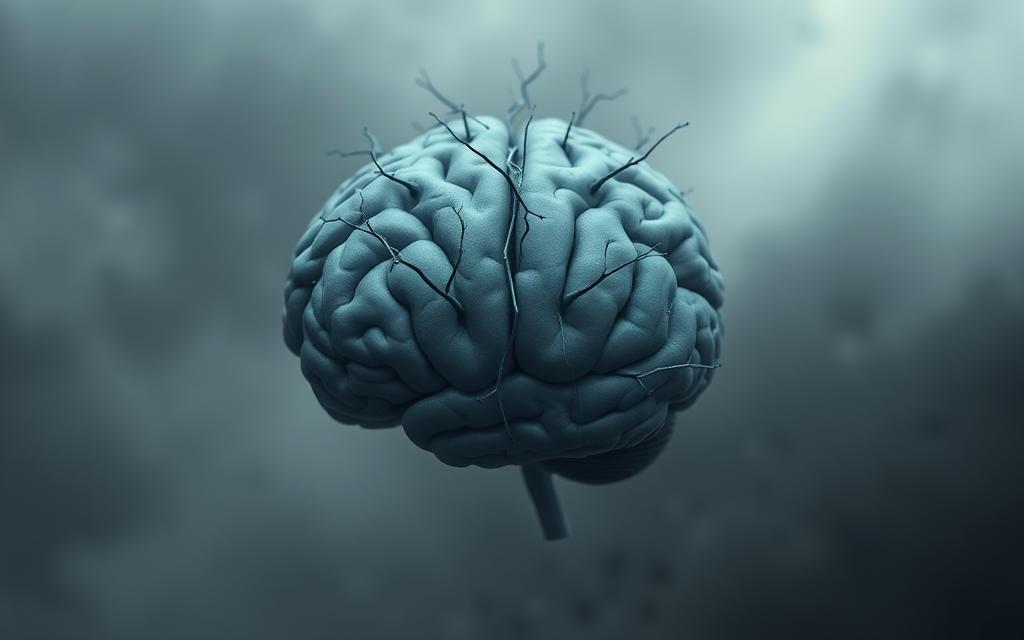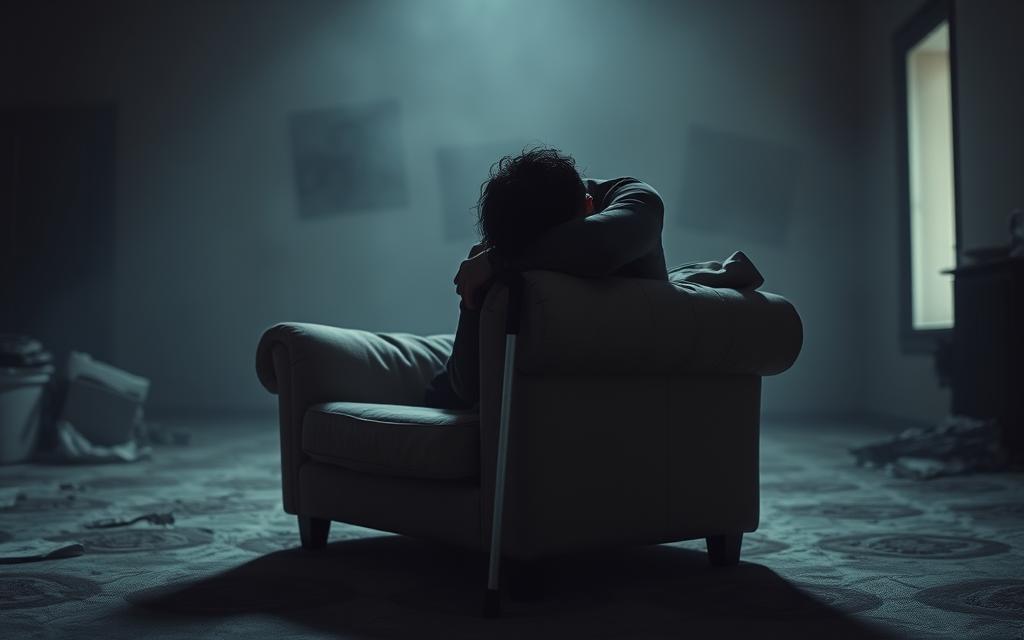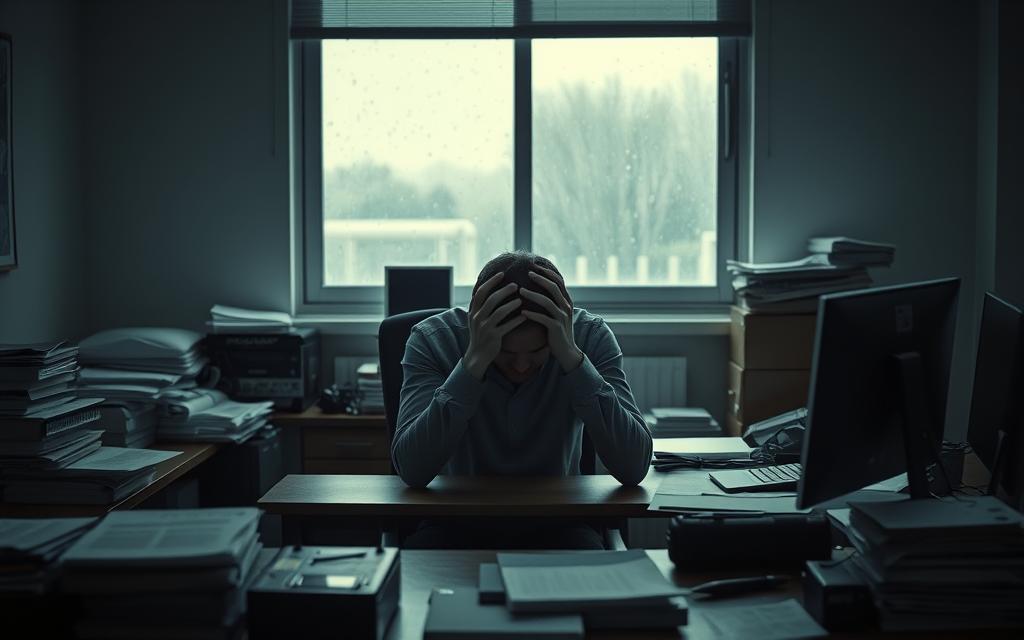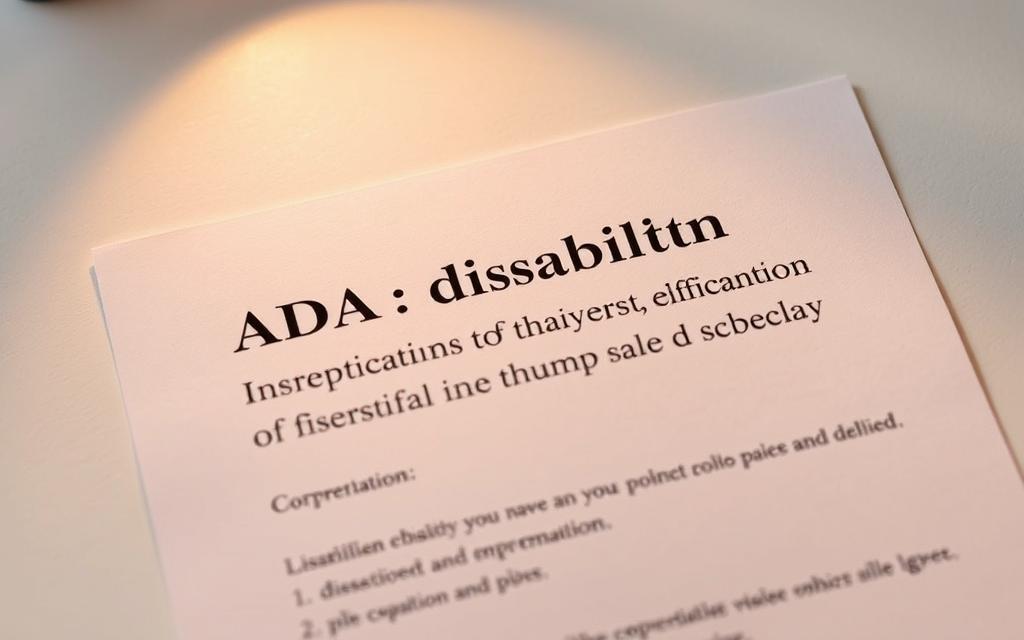Life can throw us challenges that test our strength and resilience. Depression can sneak up on us, casting a shadow over our days. It changes how we see our world. For many, it’s not just emotional pain but also affects how we function daily.
The World Health Organization says about 5% of adults worldwide deal with depression. In the U.S., 21 million adults had a major depressive episode in 20201. Understanding depression is key for those affected to get help and make changes in their lives.
Depression is the top cause of disability for those 15 to 442. This shows how urgent it is to tackle this issue. Behind the numbers are real people fighting to find balance in their lives.
Key Takeaways
- Depression significantly affects individuals’ quality of life.
- It is the leading cause of disability for individuals aged 15 to 44.
- Approximately 5% of adults worldwide experience depression.
- Understanding depression is crucial for seeking help.
- Major Depressive Disorder (MDD) can greatly impact daily functionality.
Understanding Depression as a Mental Health Condition
Depression is a serious mental health condition that affects mood, behavior, and thoughts. It’s not just feeling sad for a while. It’s a long-term illness that needs care and attention. Around the world, about 5% of adults have depression, showing how common it is3.
About 3.8% of people have depression, with some groups more affected than others3. Women are usually 1.5 to 3 times more likely to get depression than men4.
In the U.S., nearly 29% of adults have been diagnosed with depression at some point5. Around 18% are currently dealing with it5. Depression often starts in late teens to mid-20s, making early help key5.
The cost of depression is huge, with the U.S. economy losing about $210 billion a year4. But, there are good treatments, with 70% to 90% of people getting better with therapy5.
Major Depressive Disorder: An Overview
Major Depressive Disorder (MDD) is a common mental health issue affecting millions in the U.S. In 2020, about 21 million adults had at least one major depressive episode. This is 8.4% of all adults6. It makes everyday tasks hard because of low mood, tiredness, and thinking problems7.
Almost one in five adults will face MDD at some point in their lives. This is based on a 20.6% lifetime prevalence6.
MDD was the third biggest disease burden worldwide in 2008. It’s expected to become the number one cause by 20308. Depression symptoms can be mild or severe, affecting daily life6.
It doesn’t matter if you’re young, old, male, female, or from any background. MDD can affect anyone7. Changes in brain chemistry, like serotonin levels, are key in causing and keeping MDD7.
Knowing about MDD is important. There are treatments like lifestyle changes, medicines, and therapy. These can greatly improve life quality and function for many8
Symptoms of Depression and Their Impact on Daily Life
It’s important to know the signs of depression. They can really change how we live every day. Common symptoms include feeling sad all the time, having little energy, and changes in how much we eat. These can make it hard to think clearly and make decisions.
Common Symptoms of Depression
Depression shows up in different ways, so it’s key to recognize them. Many people feel:
- Low energy
- Persistent sadness
- Changes in sleep
- Changes in appetite
- Irritability and anxiety
About 7% of adults in the U.S. deal with major depression each year9. Depression can really affect how we live, with 50% of people facing big challenges in daily life9. It affects our mental, physical, and social health.
How Symptoms Affect Functionality
Depression makes everyday tasks hard. For example, it can be tough to focus at work or connect with others. A depressive episode can last months, making it hard to keep up with daily tasks9.
Feeling worthless is a big part of depression10. This makes it even harder to deal with everyday problems. The mental strain can lead to serious issues, like a higher risk of suicide, with 15% of untreated cases considering it9.

How Depression Leads to Disability
Depression is a serious mental health issue that can change our daily lives a lot. It shows how depression and disability are linked, mainly when symptoms get really bad. The World Health Organization says about 5% of adults worldwide deal with depression1.
In the United States, around 21 million adults had a major depressive episode in 2020. This is about 8.4% of all adults1.
To be diagnosed with major depressive disorder (MDD), symptoms must last two weeks or more. They must also make daily life very hard. The Americans With Disabilities Act (ADA) sees MDD as a mental issue that could be a disability if it really limits life activities1.
About 30% to 59% of women with disabilities also have depression11. This shows that people with physical disabilities are at least three times more likely to have depression than those without disabilities11.
Understanding how depression can lead to long-term disability is key. Recognizing the link between depression and disability is vital. It helps us create better support for those affected.

Understanding the Relationship Between Depression and Employment
Depression and work are closely linked. Mental health greatly affects how well we do at our jobs. Depression is the top reason for disability worldwide, causing many to lose their jobs12.
Studies show that people with depression often miss a lot of work. They might miss up to 73 days in a year because of health issues13. About 77% of workers with depression say they’ve lost time at work, showing how mental health affects jobs13.
Impact on Work Performance
Depression can hurt work performance in many ways. It can lead to less money and more unemployment14. At work, depression makes it hard to focus, make decisions, and finish tasks. This can make it hard to meet job demands.
For example, 22% of people struggle with their bosses at work. This could be because of mental health problems13.
Inability to Maintain Employment
Keeping a job is tough for those with depression. Work that’s too demanding can make mental health worse14. Studies show that only 55% of people with depression can keep their jobs over time13.
As depression gets worse, people often change jobs a lot. This can lead to losing jobs, showing how depression affects keeping a job13.

Legal Definitions of Disability Under the ADA
The Americans with Disabilities Act (ADA) is key in protecting people with various conditions, like depression. It says any condition that limits major life activities is covered. This means people with major depressive disorders need to know their rights under this law.
About 44 million adults in the U.S. have had a mental health issue in the past year. This is about 18.5% of the population. It shows how common mental health issues are, affecting many people’s lives15.
Recent numbers show 18% of U.S. workers have a mental health condition each month. This highlights how common mental disabilities are under the ADA15. The Equal Employment Opportunity Commission (EEOC) has seen over 20,000 mental health discrimination cases. This shows the big challenges people with mental health issues face at work16.
Also, about 50% of people with mental health issues say they face discrimination at work. This makes it hard for them to get the help they need16.
Workplace adjustments for mental disabilities are often very affordable, costing less than $500. Yet, they are crucial for helping people work better. In fact, studies show these adjustments can boost productivity by up to 30%16.
The ADA Amendments Act of 2008 has helped more people with mental impairments. It makes sure their rights are protected and promoted15.

Social Security Administration Criteria for Disability
The Social Security Administration (SSA) has clear disability criteria for those seeking disability benefits. People with depression must go through a detailed evaluation. The SSA looks at how depression affects daily life.
Criteria for Major Depressive Disorder
To get benefits for Major Depressive Disorder (MDD), you must show symptoms like a depressed mood and loss of interest. The SSA needs a 12-month history of these symptoms. They check mental health in four main areas: understanding, interacting, concentrating, and managing oneself17.
It’s also key to have medical proof to back up your claim17.
Financial Assistance Options Available
If you meet the SSA’s MDD criteria, you might get financial assistance. This includes Social Security Disability Insurance (SSDI) and Supplemental Security Income (SSI). SSDI pays about $1,362 a month, and SSI around $91418.
But, only about 30.4% of disability claims were approved in 2018. This shows how tough it is to get SSA support18. To succeed, you need to document your condition well. The SSA might not approve you if you earn over $1,350 a month18.
Accommodations for Individuals with Depression in the Workplace
We know that making the workplace better for those with depression is key. The Americans with Disabilities Act says employers must make adjustments to help people do their jobs well. These workplace accommodations should fit each person’s needs.
Examples of Reasonable Accommodations
There are many examples of accommodations to help those with depression. Working from home or having flexible hours can help. It lets people adjust to their personal needs while still doing their job.
Other options include part-time work, job sharing, or flexible start and end times. There are also leave options for mental health or flexible vacation time. Breaks, like more frequent ones or choosing when to take them, can also help manage mental health.
Benefits of Workplace Support
Good workplace support for mental health brings big benefits. Studies show it can make employees more productive and happier. It also cuts down on missed work days.
By supporting employees, companies create a better work environment. People feel valued and respected. This leads to a more engaged and happy team. Employers who make these changes meet legal requirements and see happier, more committed staff1920.

Importance of Treatment for Depression
Getting the right treatment for depression is key. It helps ease symptoms and stops them from getting worse. We have many treatment options to choose from, each playing a big role in managing depression.
Types of Treatment Options Available
There are many ways to treat depression. Cognitive Behavioral Therapy (CBT) is known to be very effective. It helps change negative thoughts and behaviors, focusing on the present, not the past21.
Other therapies include analytical and depth psychotherapy. These look into past experiences and current conflicts21.
Medication is also important. Antidepressants are often used for more serious cases of depression. They work best when used with therapy, helping to manage side effects like dry mouth and fatigue22.
Combining Medication and Therapy
Using both medication and therapy together is usually the best approach. This combination tackles depression from all angles, improving outcomes for those with chronic or severe depression22.
In short, seeking comprehensive mental health care is crucial. By using both psychotherapy and medication, we can improve our mental health and quality of life212223.

Managing Depression to Improve Functionality
Managing depression is key to living a better life. We can use many strategies to tackle daily challenges. By tackling our symptoms, we aim to live better and feel less depressed.
Coping Strategies for Everyday Challenges
Effective strategies like daily routines and physical activities help a lot. They make us stronger and help us recover. Mindfulness, journaling, and managing time also reduce stress and frustration.
The Role of Support Groups
Support groups are very important. They give us resources and a sense of community. Sharing our stories with others helps us cope better. These groups boost our mood and support our mental health journey.

There are also community resources for extra help. These can connect us with local groups that understand our needs. Using these resources helps us recover and live better2425.
Understanding the Psychological Aspects of Depression
Depression is more than just feeling sad. It involves certain thought patterns that make it worse. It’s the leading cause of disability worldwide, affecting over 300 million people26. In the U.S., about 15 million people are fighting depression26.
Maladaptive thinking, anxiety, and stress are key signs of depression. They can make mental health problems worse. This creates a cycle that’s hard to break.
Depression is becoming more common, hitting young people hard26. It comes in different forms, like major depression and seasonal affective disorder26. It often goes hand in hand with anxiety, making it harder to manage26.
What we eat can also play a role. Not getting enough omega-3 fats might make us more prone to depression26.
Early treatment is key to stopping depression from coming back26. Cognitive behavioral therapy is a top treatment, working well alone or with meds26. Mindfulness meditation can also help prevent depression by making us less reactive26.

Understanding depression’s psychological side helps us see the full picture of mental health. We must watch how these factors impact mental health. Working together, we can find better ways to help.
Role of Brain Chemistry and Genetics in Depression
Depression is greatly affected by brain chemistry and genetics. It’s key to grasp these biological aspects. Studies show that low levels of neurotransmitters like serotonin and norepinephrine are linked to depression. This points to a biochemical reason for mood disorders27.
This chemical imbalance often shows genetic vulnerabilities. About 40-50% of depression risk comes from genetics2827. People with a family history of major depression are two to three times more likely to experience it themselves28.
Women are more likely to get major depressive disorder, possibly due to biological and genetic reasons29. While there’s no single “depression gene,” many genetic changes can make someone more susceptible28. The classic twin design shows that both genetics and environment affect mood disorders27.
Chronic stress and environmental factors can change gene expression, linking brain chemistry to genetics27
Knowing how brain chemistry, genetics, and environment interact can help in treating depression. It offers insights for those dealing with it.
Environmental Factors Contributing to Depression
Many environmental factors can lead to depression. Things like trauma, economic struggles, and bad social interactions can make it worse. Studies show that these factors might cause more than half of depression cases, showing how important they are for our mental health30.
Childhood experiences, like breathing in pollutants, can hurt our brain’s ability to change. This makes us more likely to get depression30.
Big life events, like losing a family member, can make kids more likely to get depression30. Being born early can also raise the risk of depression by 2.75 times, showing how early life can affect us later30.
By 2020, depression is expected to be the second biggest disease causing early death. This shows it’s a big problem for society31.
Knowing about these factors helps us see when we might be at risk. It lets us take steps to prevent depression by improving mental health support. Fighting common stressors like noise and money problems can really help lower depression rates32.
| Environmental Factors | Impact on Depression |
|---|---|
| Trauma | Increases vulnerability and can trigger depressive episodes. |
| Economic Hardship | Contributes to overall stress, leading to higher depression risks. |
| Negative Social Interactions | Can exacerbate feelings of isolation and sadness. |
| Pollution and Noise | Negatively impacts mental health, causing symptoms like sleep disruption. |
| Adverse Childhood Experiences | Can lead to adult-onset neuropsychiatric disorders. |
Seeking Help: Recognizing the Signs of Depression
It’s important to know when someone might be depressed. This mental health issue can show up in many ways. Signs include feeling sad all the time, getting easily upset, and losing interest in things you used to love. Teenagers might act out more, showing anger or agitation as they deal with their feelings33.
Depression can really change how we live our day-to-day lives. Adults might feel tired, have unexplained pains, or struggle with memory and weight changes33. Women often feel guilty and might gain weight, while men might get angry or aggressive33. Knowing these signs helps us find support for those who need it.
Depression can also lead to a higher risk of suicide, making awareness key. Look out for signs like talking about harming oneself or feeling hopeless, even if they seem calm after being upset34. Since about half of those with major depression also have anxiety, it’s clear we need to offer help and support33.
The Path to Recovery: Navigating Treatment Options
Recovering from depression means understanding the many treatment options available. The World Health Organization says over 264 million people worldwide suffer from depression35. Major depressive disorder (MDD) is a common form of depression that lasts for at least two weeks35. By finding the right treatment, we can tailor our recovery to fit our unique mental health journey.
We have many ways to improve our recovery from depression. Cognitive therapy can be effective, but it depends on our personality and coping style36. Mindfulness meditation, yoga, and acupuncture can also help manage symptoms36. Plus, making healthy lifestyle choices like regular exercise and good nutrition can greatly improve our mental health36.
Working together with healthcare professionals is key, as they can help manage medication36. It’s important to make our treatment plans personal, as depression often happens with other mental health issues36. Joining community activities and building support networks can also help us feel less alone and support our recovery36.
Exploring different therapies is crucial in our mental health journey. About 70% of people who try psychotherapy see a big improvement in their symptoms35. By taking charge of our treatment and making self-care personal, we can meet our specific recovery needs36.
Conclusion
It’s key to understand how depression and disability are linked. Major depression is the top cause of disability globally, hitting millions of people. With a 20% chance of getting major depression at some point, we must tackle this issue head-on3738.
This high number shows we need good treatments and support. This way, people with depression can live happy, fulfilling lives.
Legal help and treatment options are crucial for dealing with depression. About 30.9% of people don’t get better or get worse with treatment38. This means we need ongoing support, including different therapies and help at work, for them to do well39.
Supporting people at work and understanding depression is vital. We must all help to remove stigma. This way, everyone can get the help and chances they need, improving their lives37.
FAQ
What are the common symptoms of depression?
Depression symptoms include feeling sad all the time and losing interest in things you used to enjoy. You might also notice changes in your appetite, feel really tired, or have trouble sleeping. Feeling irritable and having trouble focusing are other signs. It’s key to notice these symptoms and get help.
How does depression affect daily functioning?
Depression can make it hard to do everyday things. It might affect your relationships, work, and daily tasks. You might feel unmotivated, struggle with thinking clearly, and want to be alone more often.
What is Major Depressive Disorder (MDD)?
Major Depressive Disorder (MDD) is a serious depression that lasts more than two weeks. It makes it hard to feel emotions and do daily tasks. It can really impact your life and work.
Can depression lead to disability?
Yes, depression can make it hard to do basic things. It might cause you to miss work and struggle to keep a job. This is because depression can really affect your daily life.
What accommodations are available for employees with depression?
Employees with depression might get help like flexible work hours or working from home. Changing job tasks can also help. These changes can help their mental health and work better.
What treatment options are available for managing depression?
There are many ways to treat depression. Medications like antidepressants and therapy like cognitive behavioral therapy (CBT) are common. Using both together often works best for many people.
What role do support groups play in managing depression?
Support groups offer a community and shared experiences. They help with coping and recovery. Meeting others who understand can be really helpful.
How does brain chemistry relate to depression?
Depression is linked to imbalances in brain chemicals like serotonin and dopamine. These changes can cause depression symptoms. Each person’s brain chemistry is different.
How do environmental factors influence depression?
Things like trauma, money problems, and negative social interactions can trigger or make depression worse. Knowing these factors can help find the right support and help.
What should I do if I recognize signs of depression in myself or others?
If you see depression signs, get help from experts like psychologists or psychiatrists. Early help can lead to better treatment and a better life.
Source Links
- What to Know About Depression and Disability – https://www.webmd.com/depression/what-to-know-about-depression-and-disability
- Depression and Disability: Eligibility, Applying, and More – https://www.healthline.com/health/depression/does-depression-make-you-eligible-for-disability
- Depressive disorder (depression) – https://www.who.int/news-room/fact-sheets/detail/depression
- Overview – Depression in adults – https://www.nhs.uk/mental-health/conditions/depression-in-adults/overview/
- What Is Depression? – https://www.psychiatry.org/patients-families/depression/what-is-depression
- Depression – https://www.nimh.nih.gov/health/topics/depression
- Depression (major depressive disorder) – Symptoms and causes – https://www.mayoclinic.org/diseases-conditions/depression/symptoms-causes/syc-20356007
- Major Depressive Disorder – StatPearls – https://www.ncbi.nlm.nih.gov/books/NBK559078/
- Symptoms – Depression in adults – https://www.nhs.uk/mental-health/conditions/depression-in-adults/symptoms/
- Persistent depressive disorder – Symptoms and causes – https://www.mayoclinic.org/diseases-conditions/persistent-depressive-disorder/symptoms-causes/syc-20350929
- Relationship between Physical Disability and Depression by Gender: A Panel Regression Model – https://pmc.ncbi.nlm.nih.gov/articles/PMC5130183/
- Frontiers | The protective role of employment in depression: insights from 2005 to 2018 NHANES information – https://www.frontiersin.org/journals/psychiatry/articles/10.3389/fpsyt.2024.1455122/full
- Employment characteristics, work environment, and the course of depression over 23 years: Does employment help foster resilience? – https://pmc.ncbi.nlm.nih.gov/articles/PMC6123281/
- Impact of Long-Term Depression on Employment Outcomes: A Systematic Review and Case Series From Iraq on Career Trajectory and Job Stability – https://pmc.ncbi.nlm.nih.gov/articles/PMC11531199/
- Mental Health Conditions in the Workplace and the ADA – https://adata.org/factsheet/health
- Depression, PTSD, & Other Mental Health Conditions in the Workplace: Your Legal Rights – https://www.eeoc.gov/laws/guidance/depression-ptsd-other-mental-health-conditions-workplace-your-legal-rights
- 12.00 Mental Disorders – Adult | Disability – https://www.ssa.gov/disability/professionals/bluebook/12.00-MentalDisorders-Adult.htm
- Depression and disability: Eligibility and how to apply – https://www.medicalnewstoday.com/articles/is-depression-a-disability
- Accommodations for Employees with Mental Health Conditions – https://www.dol.gov/agencies/odep/program-areas/mental-health/maximizing-productivity-accommodations-for-employees-with-psychiatric-disabilities
- A Look at Workplace Accommodations for Employees with Depression and Anxiety – https://absencesoft.com/resources/how-to-support-and-accommodate-employees-struggling-with-depression-and-anxiety/
- Depression: Learn More – How effective is psychological treatment for depression? – InformedHealth.org – https://www.ncbi.nlm.nih.gov/books/NBK430661/
- Depression: Learn More – How is depression treated? – InformedHealth.org – https://www.ncbi.nlm.nih.gov/books/NBK279282/
- Patient education: Depression treatment options for adults (Beyond the Basics) – https://www.uptodate.com/contents/depression-treatment-options-for-adults-beyond-the-basics/print
- Depression – https://www.nimh.nih.gov/health/publications/depression
- Depression (major depressive disorder) – Diagnosis and treatment – https://www.mayoclinic.org/diseases-conditions/depression/diagnosis-treatment/drc-20356013
- Depression – https://www.psychologytoday.com/us/basics/depression
- Genetic and epigenetic factors associated with depression: An updated overview – https://pmc.ncbi.nlm.nih.gov/articles/PMC9232544/
- Major Depression and Genetics – https://med.stanford.edu/depressiongenetics/mddandgenes.html
- Brain changes in depression – PMC – https://pmc.ncbi.nlm.nih.gov/articles/PMC7864313/
- Environmental Depression Risk Factors and Impacts – https://www.brainsway.com/knowledge-center/environmental-factors-and-depression/
- Involvement of Genetic and Environmental Factors in the Onset of Depression – https://pmc.ncbi.nlm.nih.gov/articles/PMC3897684/
- The Etiology of Depression – Depression in Parents, Parenting, and Children – https://www.ncbi.nlm.nih.gov/books/NBK215119/
- Depression Symptoms: Spot the Warning Signs of Depression – https://www.helpguide.org/mental-health/depression/depression-symptoms-and-warning-signs
- Depression: Supporting a family member or friend – https://www.mayoclinic.org/diseases-conditions/depression/in-depth/depression/art-20045943
- Diving Deep into Depression: Insights, Support & Path to Recovery – https://www.medanta.org/patient-education-blog/diving-deep-into-depression-insights-support-path-to-recovery
- Personalized Depression Treatments: Navigating Your Recovery Road – https://www.insightchoices.com/blog/navigating-the-road-to-recovery-personalized-depression-treatments/
- Awareness, Diagnosis, and Treatment of Depression – https://pmc.ncbi.nlm.nih.gov/articles/PMC1496741/
- Depression: Causes, symptoms, treatment, and more – https://www.medicalnewstoday.com/articles/8933
- Preventing clinical depression: Early therapeutic interventions offer protection – https://www.sciencedaily.com/releases/2025/01/250108144158.htm
